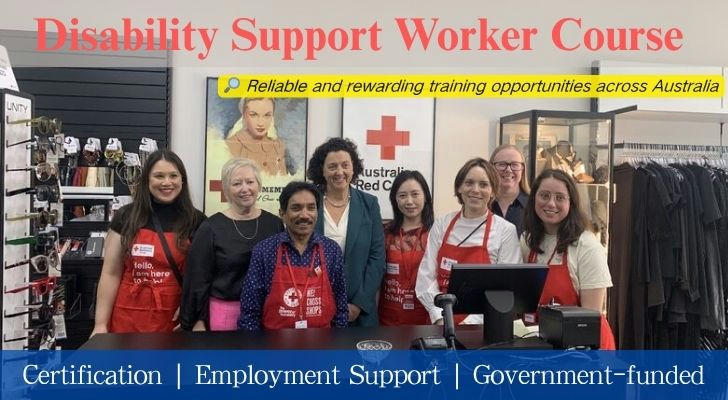Government Funded Support Worker Training in Australia – Get Paid to Train
🔎 Helping you find reliable and rewarding training opportunities across Australia
Finding a stable, rewarding job can be challenging—especially if you want meaningful work that truly changes lives. Disability and community support roles are in high demand across Australia, yet many people hesitate to join due to training costs or lack of experience.
The good news? Through government-funded and employer-supported training programs, you can now earn while you learn and start a career as a qualified Support Worker without financial stress.

Why Choose a Government-Funded Program
- Tuition fees covered or low-cost study options – Many programs are highly subsidised.
- Earn while you learn – Traineeships and apprenticeships provide paid on-the-job training.
- Guaranteed work placements – Gain real experience with community and disability service providers.
- Flexible study options – Full-time, part-time, and online modules available.
- Nationally recognised qualifications – Graduate with an accredited Certificate III or IV.
- Strong employment outcomes – Graduates are in high demand across the care sector.
Available Funded Programs
1. Certificate III in Individual Support (Disability) – CHC33021
- Entry-level qualification for new workers.
- Covers personal care, empowerment, and communication with clients.
- Often offered under Smart & Skilled (NSW) or Skilling Queenslanders for Work (QLD).
2. Certificate IV in Disability Support – CHC43121
- Designed for current workers seeking leadership roles.
- Focuses on developing and coordinating individualised plans.
- Subsidised under Jobs and Skills WA and Skills First (VIC).
3. Disability Support Worker Traineeships (Earn While You Learn)
- Paid employment plus structured training through a Registered Training Organisation (RTO).
- Commonly offered by major providers such as Anglicare, Life Without Barriers, and TAFE institutes.
- Wage rates follow the national traineeship award.
Who Can Apply (By Age Group)
- 18–24 years: Ideal for school leavers or first-time job seekers. Receive full wage subsidies and practical experience.
- 25–44 years: Great for career changers looking for stable, purpose-driven employment. Recognition of prior experience available.
- 45–59 years: Midlife retraining supported through federal Skills for Education and Employment incentives.
- 60+ years: Many programs welcome mature learners; experience and empathy are highly valued in care work.
Application Steps
- Check your state’s funding program: Visit your local TAFE or training portal (e.g., Smart & Skilled NSW, Skills First VIC).
- Choose an approved course and provider: Ensure it’s a Nationally Recognised Training (RTO).
- Confirm eligibility: Provide proof of residency, work rights, and identification.
- Apply online or via an RTO: Some programs allow direct applications through employers offering traineeships.
- Complete a short interview: To assess suitability for community care work.
- Begin your training and earn as you go!
🔎 These are general steps and may vary depending on the specific program.
Eligibility Requirements
- Australian citizen, permanent resident, or eligible visa holder.
- Aged 18 or older (some exceptions for Year 12 graduates).
- Genuine interest in disability or community support.
- National Police Check and Working with Children Check may be required.
- Ability to complete practical placement hours (usually 120–160 hours).
Other Funded and Online Course Options
- Certificate III in Community Services (CHC32015) – broader pathway into social and community care.
- Certificate IV in Allied Health Assistance (HLT43021) – suitable for those wanting to assist therapists or clinicians.
- Short online courses – Topics like Person-Centred Care, NDIS Awareness, or Infection Prevention (some free via TAFE Digital or Open Learning).
- Employer-sponsored programs – Some disability service providers cover tuition for employees joining through a traineeship contract.
Frequently Asked Questions (FAQ)
Q1: Do I get paid while studying?
Yes. Under a traineeship, you’ll receive wages from day one while completing your Certificate III or IV.
Q2: How long does the training take?
Typically 6–12 months for Certificate III, and 12–18 months for Certificate IV, depending on study pace.
Q3: Can I study online?
Yes. Most RTOs and TAFEs offer blended or online delivery combined with in-person practical placements.
Q4: What are the job outcomes?
Graduates often work as Disability Support Workers, Community Care Assistants, or NDIS Support Coordinators—with high demand nationwide.
Q5: Can international residents apply?
Only if holding an eligible working or permanent visa; otherwise, domestic funding is not available.
Conclusion
Australia’s demand for qualified Support Workers continues to rise—creating strong job security and meaningful career paths.
Government-funded and paid traineeship programs remove financial barriers, letting you build skills, earn income, and make a real impact in your community.
Whether you’re starting fresh or changing careers, now is the perfect time to join the growing support workforce and turn compassion into a sustainable profession.
